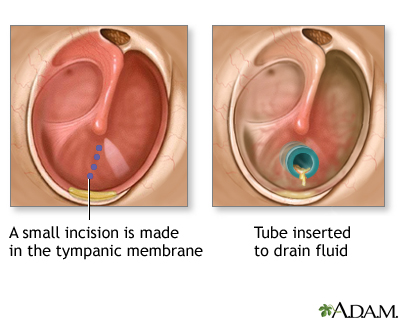Health Library
Ear tube insertion - series

Normal anatomy
The eardrum (tympanic membrane) separates the ear canal from the middle ear.

Indication
Ear tube insertion is recommended for:
- Fluid in the middle ear (present for more than 12 weeks)
- Recurrent ear infections despite efforts of prevention (more than three infections in six months)
- Ear infections that don't improve after two to three rounds of using the appropriate antibiotics
Symptoms include:
- Persistent ear pain
- Ear drainage
- Hearing loss (over a three-month period)

Procedure
While you are deep asleep and pain-free (using general anesthesia), a small incision is made in the eardrum, and the accumulated fluid is suctioned out. A small tube is inserted through the incised eardrum in order to dry out the middle ear and prevent the fluid from re-accumulating. The procedure takes less than 30 minutes, and the anesthesia used is temporary and safe. The incision heals without sutures and usually the hole closes spontaneously. The ear tubes fall out after a few months.

Aftercare
Ear tube insertion relieves pain and restores hearing immediately. Patients usually leave the hospital the same day of surgery. Most people who have had ear tube insertions are quite pleased with the results. The frequency and severity of middle-ear infections is significantly reduced. If ear infections persist after the tubes fall out, the operation can be repeated.
Related Information
Ear infection - chronicEar infection - acute
Ear tube insertion
BACK TO TOP
Review Date: 2/26/2024
Reviewed By: Josef Shargorodsky, MD, MPH, Johns Hopkins University School of Medicine, Baltimore, MD. Also reviewed by David C. Dugdale, MD, Medical Director, Brenda Conaway, Editorial Director, and the A.D.A.M. Editorial team.
 | A.D.A.M., Inc. is accredited by URAC, for Health Content Provider (www.urac.org). URAC's accreditation program is an independent audit to verify that A.D.A.M. follows rigorous standards of quality and accountability. A.D.A.M. is among the first to achieve this important distinction for online health information and services. Learn more about A.D.A.M.'s editorial policy, editorial process and privacy policy. A.D.A.M. is also a founding member of Hi-Ethics. This site complies with the HONcode standard for trustworthy health information: verify here. |
The information provided herein should not be used during any medical emergency or for the diagnosis or treatment of any medical condition. A licensed medical professional should be consulted for diagnosis and treatment of any and all medical conditions. Links to other sites are provided for information only -- they do not constitute endorsements of those other sites. No warranty of any kind, either expressed or implied, is made as to the accuracy, reliability, timeliness, or correctness of any translations made by a third-party service of the information provided herein into any other language. © 1997- 2024 A.D.A.M., a business unit of Ebix, Inc. Any duplication or distribution of the information contained herein is strictly prohibited.
